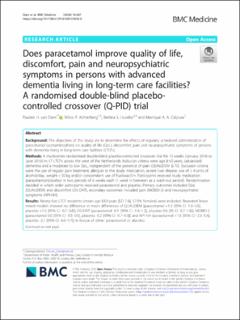| dc.description.abstract | Background
The objectives of this study are to determine the effects of regularly scheduled administration of paracetamol (acetaminophen) on quality of life (QoL), discomfort, pain and neuropsychiatric symptoms of persons with dementia living in long-term care facilities (LTCFs).
Methods
A multicentre randomised double-blind placebo-controlled crossover trial for 13 weeks (January 2018 to June 2019) in 17 LTCFs across the west of the Netherlands. Inclusion criteria were age ≥ 65 years, (advanced) dementia and a moderate to low QoL, independent of the presence of pain (QUALIDEM ≤ 70). Exclusion criteria were the use of regular pain treatment, allergies to the study medication, severe liver disease, use of > 4 units of alcohol/day, weight < 50 kg and/or concomitant use of flucloxacillin. Participants received study medication (paracetamol/placebo) in two periods of 6 weeks each (1 week in between as a wash-out period). Randomisation decided in which order participants received paracetamol and placebo. Primary outcomes included QoL (QUALIDEM) and discomfort (DS-DAT), secondary outcomes included pain (MOBID-2) and neuropsychiatric symptoms (NPI-NH).
Results
Ninety-five LTCF residents (mean age 83.9 years [SD 7.6], 57.9% females) were included. Repeated linear mixed models showed no difference in mean differences of QUALIDEM (paracetamol +1.3 [95% CI -1.0–3.5], placebo +1.5 [95% CI -0.7–3.8]), DS-DAT (paracetamol -0.1 [95% CI -1.4–1.2], placebo 0.6 [95 CI -0.7–1.8]), MOBID-2 (paracetamol 0.0 [95% CI -0.5–0.5], placebo -0.2 [95% CI -0.7–0.3]) and NPI-NH (paracetamol +1.5 [95% CI -2.3–5.4], placebo -2.1 [95% CI -6.0–1.7]) in favour of either paracetamol or placebo.
Conclusions
Compared to placebo, paracetamol showed no positive effect on QoL, discomfort, pain and neuropsychiatric symptoms in persons with advanced dementia with low QoL. It is important to find out more specifically which individual persons with advanced dementia could benefit from pain treatment with paracetamol, and for clinicians to acknowledge that a good assessment, monitoring and multidomain approach is vital for improving QoL in this vulnerable group. | en_US |

